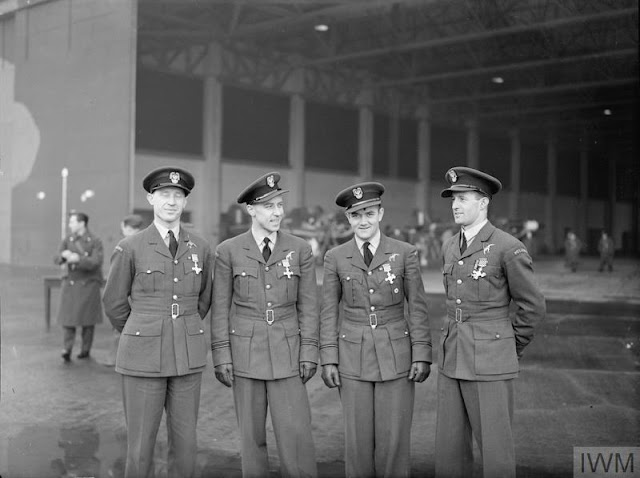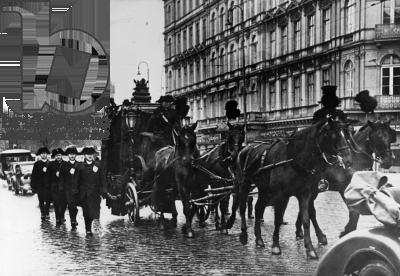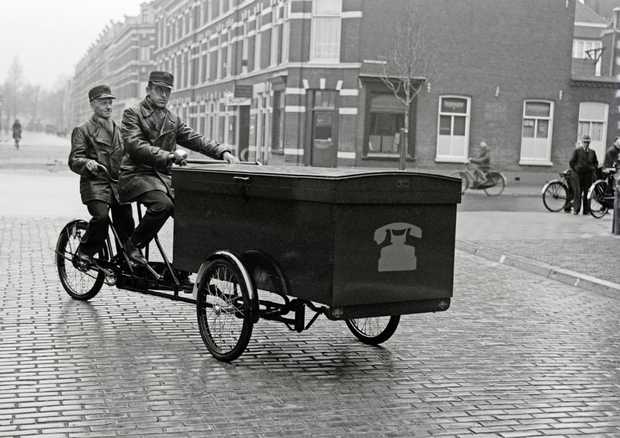Saturday 4 January 1940
 |
| "Tracer from German anti-aircraft gunfire (flak) vividly depicted in a vertical aerial photograph taken over the Port Militaire, Brest, France, during a night raid, possibly that of 4/5 January 1941." Note that this apparently was taken by an unknown official RAF photographer from one of the bombers. © IWM (C 1856). |
The RAF raids Elbasan.
European Air Operations: RAF Bomber Command targets Brest during the night, where German cruiser Admiral Hipper is anchored between voyages. No major damage reported, and the air lights up with German flak. Other bombers visit Hamburg. The weather is brutal, and not much is accomplished by either side today.
The Luftwaffe once again bombs Dublin. This has become a diplomatic incident, with the Irish government complaining to the German government. It also is leading to the suspicion that these attacks on Irish soil may not all be accidental. The other Luftwaffe raids of the night are in the western part of England, so it is quite possible that the Luftwaffe planes were off course.
Convoy FN 375 departs from Southend, Convoy FS 379 departs from Methil, Convoy FS 380 is canceled, Convoy BN 12A departs from Suez bound for Port Sudan.
U-72 (Korvettenkapitän Hans-Werner Neumann) is commissioned.
Royal Navy corvette HMS Larkspur (Lt. Stuart C. B. Hickman) is commissioned.
U-203 is launched, U-595 and U-596 are laid down.
 |
| Australian 2/2nd Battalion troops attacking into Bardia, 4 January 1941. |
The Italians are in complete disarray. General Bergonzoli and his retinue depart on foot for Tobruk. The Italians, as has been the case since the start of Operation Compass, are only too ready to surrender. There are reports of hundreds, even thousands, of Italians surrendering to isolated Australian units. The number of POWs already exceeds 10,000.
With the battle for the Bardia essentially decided already despite the Italian holdouts, Middle East Commander General Archibald Wavell quickly begins shifting forces toward the next major target, Tobruk. He sends the 7th Armoured Division (Major General Michael Creagh), which has been idle since the early stages of Operation Compass, toward the port without bothering it with Bardia, which it bypasses. The 7th Armoured is headed to cut Tobruk off from supply from the west. While Bardia is strategically important, Tobruk is the real prize in eastern Libya and has much more formidable defenses.
The Royal Navy's Mediterranean Fleet, led by battleships HMS Warspite, Barham, and Valiant, returns to Alexandria. Shockingly, the Italian fleet has not bothered to put in an appearance despite the fact that, at least on paper, it has at least parity with the British naval forces.
Far to the west, the recently renamed British Long Range Desert Group (LRDG) under Colonel Bagnold is approaching Murzuk, the Italian District Headquarters in the Fezzan Province. They intend to raid the oasis town - which had been 1300 miles from any other British forces when they set out, but now, after Operation Compass, only 700 miles away - to stir up Libyans against their Italian occupiers. This also is a good chance for cooperation with Free French in the area, who help out the LRDC men with supplies, and local Tuareg and Tibesti tribesmen. Today, the British camp out near some lava beds southwest of Tazerbo, where they will stay for three days. The Italians have no idea they are there, of course.
A Fulmar of RAF No. 803 Squadron, flying off HMS Formidable, is shot down during a reconnaissance flight over Dakar. The two aircrewmen become French POWs.
Off Cape Bon, British Swordfish torpedo bombers unsuccessfully attack an Italian supply convoy returning to Italy from Tripoli.
 |
| This photo was taken from the roof of St. Paul's in London. While dated 4 January 1941, this photo may have been taken a few days earlier and only released on the 4th (AP Photo). |
Spy Stuff: Free French leader Charles de Gaulle continues to press for the release of Vice-Admiral Emile-Henri Muselier, accused of spying and arrested by the British on the 1st. Muselier is accused of, among other things, betraying the British/Free French assault on Dakar in late 1940, Operation Menace.
German/Bulgarian Relations: Hitler meets with Bulgarian Prime Minister Bogdan Filov in Berlin and continues his campaign of trying to coerce an alliance with Bulgaria. Adopting a threatening tone (recently used by Hitler with Admiral Darlan in France, too), Hitler broadly hints that the Wehrmacht troops already taking positions for Operation Marita in Romania would be enough to take care of themselves against all comers. Hitler wants Filov to sign the Tripartite Pact, but Filov demurs and returns to Sofia to discuss the brewing crisis with his ministers.
Soviet Military: The Soviet war games that began on 2 January continue. General Zhukov, in command of the "Western" or "Blue" forces, opposes General D.G. Pavlov. While Pavlov is given a numerical advantage, Zhukov is doing quite well with his (paper) forces.
Indochina: French Indochina is granted dominion status and tariff autonomy by decree (Times, January 4, 1941, p. 2). This sounds like it is a major step toward independence, but many disagree with this interpretation. Dominion status grants Marshal Petain ultimate control over the colony rather than Parliament. He is an autocrat, as opposed to the fairly liberal Parliament, so some consider this a step backward for local rule. Dominion status also does nothing with regard to the continuing conflict with Thailand, which, among other things, has its eye on major portions of the Mekong Delta. It also does nothing to mollify Vietnamese nationalists/communists such as Ho Chi Minh, who continue strategizing some kind of revolt to achieve independence.
Burma: Lieutenant-General Harold Alexander takes command of the British I Corps in Burma.
China: The Communist New Fourth Army departs from Yunling, Anhui Province.
 |
| The New Yorker - Saturday, January 4, 1941 - Issue # 829 - Vol. 16 - N° 47 - Cover: Ilonka Karasz. |
Bugs Bunny appears in the short "Elmer's Pet Rabbit" and, for the first time, is identified as Bugs Bunny. Bugs has been developing since his first appearance in "Porky's Hare Hunt" (30 April 1938), but really has only been identifiable as Bugs since his 27 July 1940 outing in "A Wild Hare" (and which recently has received an Academy Award nomination for Best Cartoon Short Subject). "Elmer's Pet Rabbit" is considered Bugs' second true outing. Bugs Bunny makes his debut identified in a title card that simply says, "featuring Bugs Bunny"("Bugs" is the nickname of the character's first director, Ben Hardaway). Original illustrators Charlie Thorson and Cal Dalton would refer to their bunny character as "Bugs' bunny," and the name stuck after it was rather casually put in a model sheet (this is a very famous story in the animation world, though little-known elsewhere). Bugs Bunny's real name, revealed later, is George Washington Bunny, and Mel Blanc later recalled they were considering "Happy Rabbit" (or "Happy Wabbit" as Elmer Fudd would say).
They are still working on the character at this juncture, and this Bugs Bunny looks and sounds less like the Bugs known in later years than he did in the previous July's "A Wild Hare." Chuck Jones directs this time, and Mel Blanc voices Bugs (though he is uncredited). Cartoons at this point in time are considered adult entertainment, and they bring vivid technicolor to the Saturday night at the Bijou at a time when virtually everything else there is in black and white.
Future History: Movie stars Ronald Reagan and Jane Wyman welcome Maureen Elizabeth Reagan into the world. Maureen is their first child. She becomes an actress, appearing In "Kissing Cousins" with Elvis Presley, but eventually gives that up as her father becomes a famous political figure. Later, she herself runs for political office but loses both times. Maureen is very supportive of her father during his time as US President and afterward. Maureen Reagan passes away at 60 from cancer on 8 August 2001, predeceasing her father.
January 1941
January 1, 1941: Muselier ArrestedJanuary 2, 1941: Camp Categories
January 3, 1941: Liberty Ships
January 4, 1941: Aussies Take Bardia
January 5, 1941: Amy Johnson Perishes
January 6, 1941: Four Freedoms
January 7, 1941: Pearl Harbor Plans
January 8, 1941: Billions For Defense
January 9, 1941: Lancasters
January 10, 1941: Malta Convoy Devastation
January 11, 1941: Murzuk Raid
January 12, 1941: Operation Rhubarb
January 13, 1941: Plymouth Blitzed
January 14, 1941: V for Victory
January 15, 1941: Haile Selassie Returns
January 16, 1941: Illustrious Blitz
January 17, 1941: Koh Chang Battle
January 18, 1941: Luftwaffe Pounds Malta
January 19, 1941: East African Campaign Begins
January 20, 1941: Roosevelt 3rd Term
January 21, 1941: Attack on Tobruk
January 22, 1941: Tobruk Falls
January 23, 1941: Pogrom in Bucharest
January 24, 1941: Tank Battle in Libya
January 25, 1941: Panjiayu Tragedy
January 26, 1941: Churchill Working Hard
January 27, 1941: Grew's Warning
January 28, 1941: Ho Chi Minh Returns
January 29, 1941: US Military Parley With Great Britain
January 30, 1941: Derna Taken
January 31, 1941: LRDG Battered
2020






